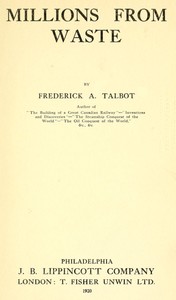Millions from Waste by Frederick Arthur Ambrose Talbot
"Millions from Waste" by Frederick A. Talbot is a non-fiction publication written in the early 20th century. The book explores the reclamation and exploitation of waste products in industry, highlighting how these often-overlooked resources can be transformed into significant economic assets. Talbot aims to raise awareness about the potential wealth embedded in waste and to promote methods of thrift and effective resource management to benefit both individuals and the broader community. The
opening of the book introduces the pressing issue of industrial waste, linking it to economic extravagance and environmental impact. Talbot sets the context by explaining how a lack of awareness leads to wastefulness, especially in domestic settings. He discusses the relationship between waste and economic efficiency, asserting that even minor actions to reclaim and repurpose waste can lead to substantial benefits. Through specific examples, he emphasizes the need for society to embrace a more conscientious approach to waste management, ultimately arguing that understanding and utilizing waste is crucial for sustainable development and economic growth. (This is an automatically generated summary.)
Read or download for free
| How to read | Url | Size | |||
|---|---|---|---|---|---|
| Read now! | https://www.gutenberg.org/ebooks/67837.html.images | 736 kB | |||
| EPUB3 (E-readers incl. Send-to-Kindle) | https://www.gutenberg.org/ebooks/67837.epub3.images | 546 kB | |||
| EPUB (older E-readers) | https://www.gutenberg.org/ebooks/67837.epub.images | 543 kB | |||
| EPUB (no images, older E-readers) | https://www.gutenberg.org/ebooks/67837.epub.noimages | 394 kB | |||
| Kindle | https://www.gutenberg.org/ebooks/67837.kf8.images | 779 kB | |||
| older Kindles | https://www.gutenberg.org/ebooks/67837.kindle.images | 736 kB | |||
| Plain Text UTF-8 | https://www.gutenberg.org/ebooks/67837.txt.utf-8 | 692 kB | |||
| Download HTML (zip) | https://www.gutenberg.org/cache/epub/67837/pg67837-h.zip | 576 kB | |||
| There may be more files related to this item. | |||||
Similar Books
About this eBook
| Author | Talbot, Frederick Arthur Ambrose, 1880-1924 |
|---|---|
| LoC No. | 20002995 |
| Title | Millions from Waste |
| Original Publication | United States: J. B. Lipincott Company,1920. |
| Contents | Waste: its relation to commerce and national economy -- The German conquest of waste -- Salvage from the army swill-tub -- The reclamation of military organic waste -- Invention in its application to waste recovery -- Saving the scrap from the sea -- Winning wealth from slaughter-house offal, condemned meat, bones, and blood -- Turning wastes into paper -- Supplying industries from the dust-bin -- Living on waste -- Potato waste as an asset to industry -- Converting nitrogenous refuse into soap -- Turning old oil into new -- By-products from the waste-bin -- The lifting magnet as a waste-developing force -- Reclaiming 321,000,000 gallons of liquid fuel from coal -- Fertilizers from wastes -- Saving the sewage sludge -- House-building with wastes -- The future of the waste problem; possibilities for further development. |
| Credits | deaurider and the Online Distributed Proofreading Team at www.pgdp.net (This file was produced from images generously made available by The Internet Archive) |
| Reading Level | Reading ease score: 47.8 (College-level). Difficult to read. |
| Language | English |
| LoC Class | TP: Technology: Chemical technology |
| Subject | Waste products |
| Subject | Salvage (Waste, etc.) |
| Category | Text |
| EBook-No. | 67837 |
| Release Date | Apr 15, 2022 |
| Most Recently Updated | Oct 18, 2024 |
| Copyright Status | Public domain in the USA. |
| Downloads | 546 downloads in the last 30 days. |
| Project Gutenberg eBooks are always free! | |

